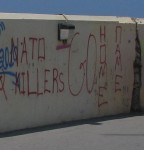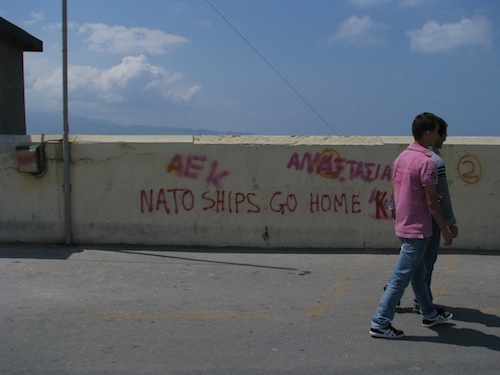I just returned from Crete, the Greek island that serves as a stop-over for NATO aircraft and warships on their way to Libya. Graffiti such as this was the most visible public sentiment regarding those controversial bombing missions.
It’s worth noting that Greece is a NATO member.
In late March, cretalive.gr obtained video of NATO craft coming and going from the Souda Bay naval station, pictures of the sort I wasn’t well-positioned to duplicate.
OnAlert.gr has more recent PR photos demonstrating Greek cooperation in NATO’s Libya attacks. Striking a less congratulatory note, here is the latest statement from the Greek foreign minister, Capt. Obvious: “We cannot reach a solution in Libya through military means alone.”
 Whatever else one thinks of it, the allied military presence was not evidently providing much of a boost to Crete’s tourism economy, which has been suffering. A taverna owner told me that, in his 21 years of experience, NATO personnel rarely venture far from their (publicly inaccessible) bases; when they do, they tend to stay in the higher-end resorts. That’s not much of a surprise, nor is it a crime (unless you happen to manage a small bungalo).
Whatever else one thinks of it, the allied military presence was not evidently providing much of a boost to Crete’s tourism economy, which has been suffering. A taverna owner told me that, in his 21 years of experience, NATO personnel rarely venture far from their (publicly inaccessible) bases; when they do, they tend to stay in the higher-end resorts. That’s not much of a surprise, nor is it a crime (unless you happen to manage a small bungalo).
Indeed, from what I saw, Crete was anything but overrun with foreign troops and contractors. Of the latter group, there were a few traces. Brinks, known for its armored trucks, ran passenger security at the Heraklion airport, which serves both civilian and military aircraft. And I caught sight of the G4S logo in a few places. That’s the same fast-growing contractor whose vehicles I spotted guarding the plaza in Marrakech, a couple of months before it was bombed by a 25-year-old admirer of Al Qaeda who learned how to make explosives online from his parents’ house, where he lived.
I mention that little detail only to show that the opinions of frustrated, under-employed and poorly educated young men are sometimes worth paying attention to. They’re just the sort of people who spray graffiti near national landmarks, or, under more desperate circumstances, blow up a café full of tourists.
